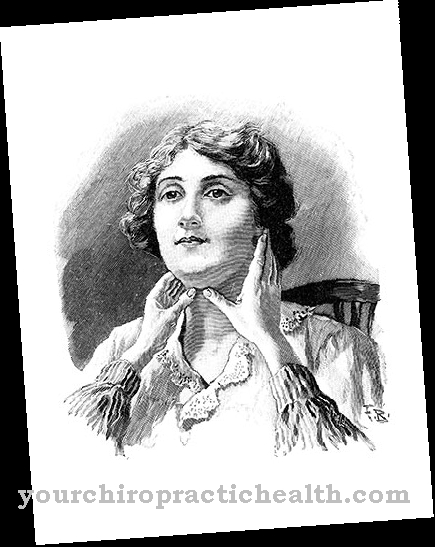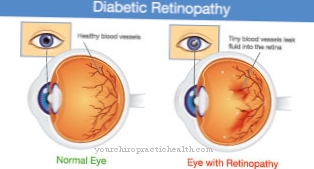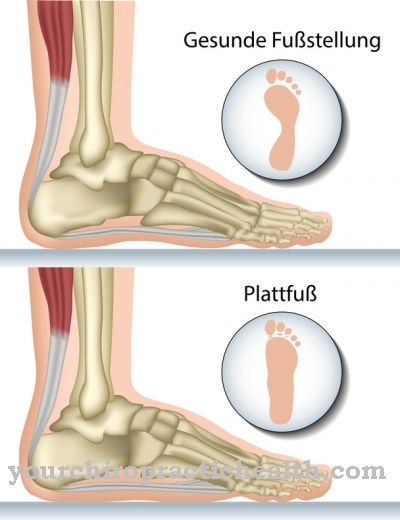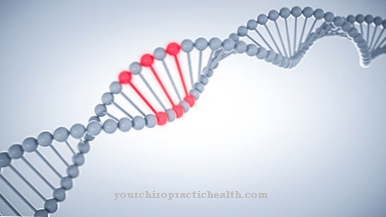The Pneumatoris coli is a special form of pneumatosis intestinalis, which is characterized by gas deposits in the wall of the colon. The phenomenon is often accompanied by the formation of cysts. Treatment depends on the primary cause and can range from antibiotics to therapeutic endoscopy.
What is Pneumatoris Coli?

© andriano_cz– stock.adobe.com
Pneumatosis intestinalis is an intramural accumulation of gas in the digestive tract. In medicine and radiology, this phenomenon is a very rare finding that mainly affects the colon. The gas accumulates in the wall of the large intestine or other digestive tract and can occur in different layers of the organs.
The subserous form below the serosa is differentiated from a submucosal form below the mucosa. Pneumatosis intestinalis can also be classified according to the organ affected. An intramural accumulation of gas in the colon is associated with this Pneumatosis coli called. In pneumatosis cystoides coli, the gases are present in the colon wall in the form of cystic inclusions.
The first use of the term pneumatosis intestinalis comes from Lerner and Gazin and is dated to 1946. The exact cause of the disease has not yet been conclusively clarified. Since the disease is an extremely rare disease and therefore only a few case reports exist, research into the cause will probably take some time.
causes
Pneumatosis coli can be both a primary idiopathic and a secondary case. The secondary occurrence in the context of another general illness corresponds to the more common variant. Infections are a possible cause. For example, an infection by the colonized bacteria can lead to increased formation of gases.
The formation of gas-containing cysts is conceivable in this context. Mechanical factors are also conceivable. In some secondary cases, pneumatosis coli has also been associated with obstructive pulmonary diseases, such as bronchial asthma or chronic obstructive pulmonary emphysema.
Intestinal necrosis as a result of ischemia, necrotizing enterocolitis, sepsis and increased intraluminal pressure due to gastric ulcers are currently discussed as causes. A connection with immunosuppressed patients could also be observed.According to speculations, immunosuppression is associated with reduced intestinal wall integrity, so that secondary gas entry can occur.
Symptoms, ailments & signs
Pneumatosis coli can manifest itself through a number of different symptoms and complaints. The disease is typically associated with acute and severe diarrhea. The diarrhea occurs at the beginning of the illness and gets worse as the disease progresses. This is accompanied by stomach pains, flatulence and occasionally bloody excretions.
In individual cases, deficiency symptoms can occur as a result of the high fluid loss. As the disease progresses, other complaints arise, especially in the gastrointestinal tract. This significantly reduces the quality of life of those affected. As a result, psychological complaints such as depression or [[fear, fears] often develop.
Inferiority complexes and reduced self-esteem are also typical. On the physical side, pneumatosis coli can develop into Chron disease. Then chronic gastrointestinal complaints occur, such as flatulence and a bloated stomach, which represent a further health burden for the person concerned.
If the disease is treated early, such a severe course can usually be averted. The symptoms of pneumatosis coli subside after a few days, provided the underlying disease is carefully cured. In the absence of treatment, chronic complaints develop, which severely limit the quality of life and life expectancy of the patient.
course
The clinical picture of patients with Pneumatoris coli depends on the individual case and, especially in the secondary form, is shaped by the primary cause. For example, pain is just as conceivable as impaired digestion or bowel movements. What all patients have in common is the accumulation of gas in the intestinal wall. In most patients, this cluster is in the form of cysts and mostly affects the right colon.
The left or transverse colon is less commonly affected. Later on, more or less severe complications can occur in the intestine. Obstructions of the colon are in the foreground. However, gastrointestinal bleeding is also conceivable. In extreme cases, perforation of the intestine has been observed.
In medicine, this is a puncture or perforation of the tissue that surrounds the intestine. In addition, immunological inflammation of the colon as a result of complications is conceivable.
Diagnosis & course of disease
The most important criteria for a diagnosis of Pneumatoris coli are the gases in the intestinal wall or possibly the gas-filled cysts. The doctor will detect the gas accumulation with an abdominal X-ray examination. In the differential diagnosis of cysts, pseudopolyps can be excluded. The distinction can be made by means of a gas analysis.
The cysts usually contain gas in a composition of five to fifteen percent O2, up to ninety percent N2 and between 0.3 and five percent CO2. False positive results can result from flatulence. Computed tomography is the method of choice for reliable delimitation, as this imaging can be used to differentiate between intramural and extramural gas accumulation. Except for the complications mentioned above, the course of Pneumatoris coli is considered benign.
Complications
With this disease, those affected primarily suffer from various digestive disorders. These usually have a very negative effect on the quality of life of the person affected and can significantly reduce it. Deformations of the intestine can also occur as a result of the disease and significantly reduce the patient's quality of life.
This leads to inflammation and thus to various complications. Gases can accumulate in the intestinal wall, which can lead to the formation of cysts. If the disease is not treated, life expectancy can be significantly reduced. Ulcers in the stomach can also occur and have a negative effect on digestion. In many cases, those affected then deliberately eat less food and suffer from underweight or various deficiency symptoms.
In most cases, there are no complications with treatment. With the help of surgical interventions, the cysts can be easily removed. Likewise, patients are dependent on taking antibiotics to prevent inflammation. Whether pneumatosis coli will lead to a reduced life expectancy cannot be universally predicted.
When should you go to the doctor?
If gastrointestinal complaints and other signs of pneumatosis intestinalis or pneumatosis coli occur, a doctor is recommended in any case. The doctor can diagnose the rare bowel disease and suggest further measures. Anyone who notices signs of an intestinal obstruction or even an intestinal rupture must call the emergency doctor. The symptoms must be clarified immediately and, if necessary, treated intensively. Affected persons can call in their family doctor or gastroenterologist. Other contacts are the internist or a pulmonologist.
If there are psychological problems as a result of the gastrointestinal problems, a therapist can also be called in. People who have recently suffered a gastrointestinal infection or who have intestinal cysts are particularly at risk. Obstructive lung diseases are also associated with pneumatosis coli. Anyone who is at risk should consult their doctor if the symptoms mentioned occur. Further medical clarification is necessary if gastrointestinal complaints or other symptoms suddenly recur after recovery that indicate that the disease has returned or has not been completely cured.
Therapy & Treatment
Therapy for Pneumatoris coli in a secondary form is mainly based on the primary disease. Primary Pneumatoris coli does not necessarily have to be treated, but can also be monitored under certain circumstances. This is especially true in cases with low gas accumulation that do not cause symptoms. If there are cystic inclusions, the cysts are ideally removed by minimally invasive procedures.
One such method is, for example, therapeutic endoscopy, which is often used for intestinal interventions such as the removal of polyps. The body shell is spared. Under certain circumstances, treatment with antibiotics may be necessary in addition to removing the cysts and in the case of cystless gas deposits. This treatment is preferably based on the administration of metronidazole.
Only in extremely serious cases is it necessary to administer oxygen for several days in the case of Pneumatoris coli. If complications arise, the attending physician should act as quickly as possible to prevent perforation of the intestine. In this context, surgical intervention may be the therapy of choice. Minor bleeding, on the other hand, does not necessarily require surgical intervention and must be discussed by the doctor in view of the benefits and risks.
You can find your medication here
➔ Medication for diarrheaprevention
So far, apart from the connections with certain primary diseases, no causes for Pneumatoris coli are known. This restricts the preventive measures to the respective primary causes mentioned. No preventive steps are available for ideopathic Pneumatoris coli.
Aftercare
In most cases, those affected have very few or only very limited follow-up measures available for pneumatosis coli. Since this is a very rare disease, it is usually only recognized by chance. Therefore, the focus of this disease is on a quick and, above all, an early diagnosis so that there are no complications or other complaints for the person affected in the further course.
In pneumatosis coli, self-healing is usually not possible, so that the person affected is usually always dependent on medical treatment. Most patients will need surgery to relieve the symptoms. After such an operation, the person concerned should definitely rest and take care of his body.
Exertion or stressful and physical activities should be avoided in any case. Likewise, only light food should be consumed immediately after the procedure. It cannot generally be predicted whether pneumatosis coli will reduce the life expectancy of the person affected.
You can do that yourself
Since this very rare disease is a form of pneumatosis intestinalis, the same recommendations for self-help in everyday life apply here. First of all, however, it also applies here that there may be another underlying disease that triggered pneumatosis coli. She should be found and treated.
Because the disease is often associated with lung disease, it is imperative that patients quit smoking. Exercise and sporting training in the fresh air support lung function. If bronchial asthma or even pulmonary emphysema is already present, these diseases must be treated in accordance with the guidelines.
When it comes to pneumatosis coli, it is important to support the body's own immune system, because the immune system of the affected patient is often weakened. If the diarrhea is severe, it can be helpful if the person concerned is on an appropriate diet. The loss of fluid should also be compensated for. Up to three liters of fluid intake per day are necessary for this. We recommend drinks such as non-carbonated water, mild herbal teas or vegetable broths. A regulated sleep-wake cycle with sufficient rest also supports the immune system. The ingestion of living intestinal bacteria supports the intestinal flora.




.jpg)






















